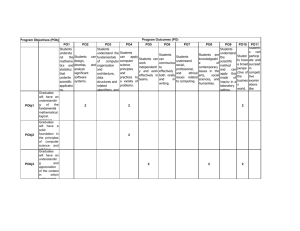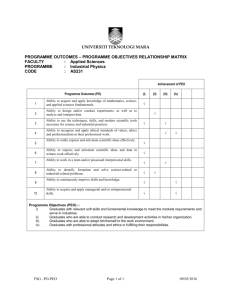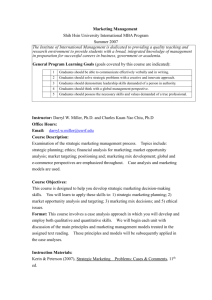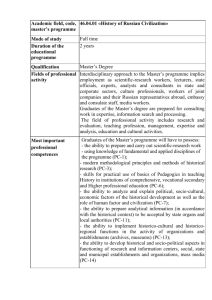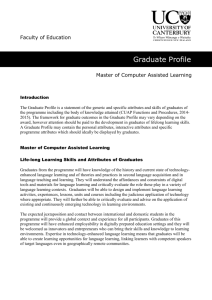Document 10375069
advertisement
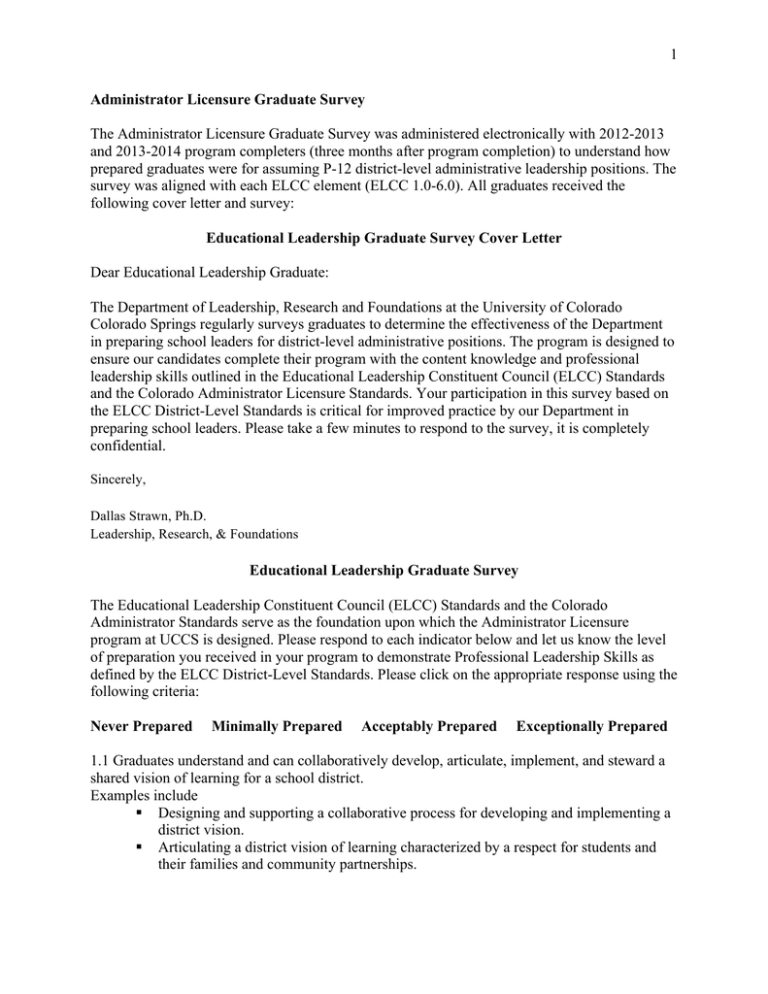
1 Administrator Licensure Graduate Survey The Administrator Licensure Graduate Survey was administered electronically with 2012-2013 and 2013-2014 program completers (three months after program completion) to understand how prepared graduates were for assuming P-12 district-level administrative leadership positions. The survey was aligned with each ELCC element (ELCC 1.0-6.0). All graduates received the following cover letter and survey: Educational Leadership Graduate Survey Cover Letter Dear Educational Leadership Graduate: The Department of Leadership, Research and Foundations at the University of Colorado Colorado Springs regularly surveys graduates to determine the effectiveness of the Department in preparing school leaders for district-level administrative positions. The program is designed to ensure our candidates complete their program with the content knowledge and professional leadership skills outlined in the Educational Leadership Constituent Council (ELCC) Standards and the Colorado Administrator Licensure Standards. Your participation in this survey based on the ELCC District-Level Standards is critical for improved practice by our Department in preparing school leaders. Please take a few minutes to respond to the survey, it is completely confidential. Sincerely, Dallas Strawn, Ph.D. Leadership, Research, & Foundations Educational Leadership Graduate Survey The Educational Leadership Constituent Council (ELCC) Standards and the Colorado Administrator Standards serve as the foundation upon which the Administrator Licensure program at UCCS is designed. Please respond to each indicator below and let us know the level of preparation you received in your program to demonstrate Professional Leadership Skills as defined by the ELCC District-Level Standards. Please click on the appropriate response using the following criteria: Never Prepared Minimally Prepared Acceptably Prepared Exceptionally Prepared 1.1 Graduates understand and can collaboratively develop, articulate, implement, and steward a shared vision of learning for a school district. Examples include ! Designing and supporting a collaborative process for developing and implementing a district vision. ! Articulating a district vision of learning characterized by a respect for students and their families and community partnerships. 2 ! ! Developing a comprehensive plan for communicating the district vision to appropriate district constituencies. Formulating plans to steward district vision statements. 1.2 Graduates understand and can collect and use data to identify school goals, assess organizational effectiveness, and implement plans to achieve district goals. Examples include ! Developing and using evidence-centered research strategies and strategic planning processes. ! Creating district-based strategic, tactical, and strategic goals. ! Collaboratively developing implementation plans to achieve those goals. ! Evaluating district improvement processes. 1.3 Graduates understand and can promote continual and sustainable district improvement. Examples include ! Identifying strategies or practices to build organizational capacity to support continual and sustainable district improvement. ! Identifying strategies for developing district leadership capacity. ! Creating a district plan to implement transformational change. ! Designing a comprehensive, district-level professional development program. 1.4 Graduates understand and can evaluate district progress and revise district plans supported by district stakeholders. Examples include ! Developing a district plan to monitor program development and implementation of district goals. ! Constructing evaluation processes to assess the effectiveness of district plans and programs. ! Interpreting information and communicating progress toward achievement of district vision and goals for educators in the district community and other stakeholders. 2.1 Graduates understand and can sustain a district culture and instructional program conducive to student learning through collaboration, trust, and a personalized learning environment with high expectations for students. Examples include ! Leading district change and collaboration that focuses on improvements to district practices, student outcomes, curriculum, and instruction. ! Incorporating cultural competence in the development of programs, curriculum, and instructional practices. ! Using learning management systems to support personalized learning across the district. ! Developing comprehensive programs that meet the unique learning needs and interests of diverse students populations and school personnel across the district. ! Promoting trust, equity, fairness, and respect among school board members, school administrators, faculty, parents, students, and the district community. 3 2.2 Graduates understand and can create and evaluate a comprehensive, rigorous, and coherent curricular and instructional district program. Examples include ! Aligning curriculum and instruction with district assessments. ! Collaborating with faculty across the district to plan, implement, and evaluate a coordinated, aligned, and articulated curriculum. ! Using evidence-centered research in making curricular and instructional decisions. ! Providing district resources to support quality curriculum and instruction. ! Designing evaluation systems, making district plans based on multiple measures of teacher performance and student outcomes, and providing feedback based on evidence. 2.3 Graduates understand and can develop and supervise the instructional and leadership capacity across the district. Examples include ! Collaboratively developing plans to improve the district’s effect on teaching and learning. ! Designing the use of differentiated instructional strategies, curriculum materials, and technologies to maximize high-quality instruction within the district. ! Facilitating school leadership through development of district activities that focus on teaching and student learning. ! Designing district-level professional growth plans to increase the capacity of school staff and leaders that reflect national professional development standards. ! Using a variety of district approaches to improve school staff performance. ! Developing district systems for effective and efficient management of policies, procedures, and practices. 2.4 Graduates understand and can promote the most effective and appropriate district technologies to support teaching and learning within the district. Examples include ! Using technologies to enrich district curriculum and instruction. ! Monitoring instructional practices across the district and providing assistance to school administrators. ! Using technology and performance management systems to monitor, analyze, and evaluate district data results for accountability reporting. 3.1 Graduates understand and can monitor and evaluate district management and operational systems. Examples include ! Analyzing district processes and operations to identify and prioritize strategic and tactical challenges for the district. ! Developing district operational policies and procedures. ! Developing plans to implement and manage long-range plans for the district. ! Developing plans to create and sustain strategic alignment throughout the district. 4 3.2 Graduates understand and can efficiently use human, fiscal, and technological resources within the district. Examples include ! Developing multi-year fiscal plans and annual budgets aligned to the district’s priorities and goals. ! Analyzing a district’s budget and financial status. ! Developing facility and space utilization plans for the district. ! Projecting long-term resource needs of a district. ! Using technology to manage district operational systems. 3.3 Graduates understand and can promote district-level policies and procedures that protect the welfare and safety of students and staff across the district. Examples include ! Improving and implementing district policies and procedures for safe and secure central office and school-work environments (including district office, school personnel, students, and visitors that encompass crisis planning and management). ! Evaluating and implementing a district-wide discipline management plan. 3.4 Graduates understand and can develop district capacity for distributed leadership. Examples include ! Identifying leadership capabilities of staff at various levels within the district. ! Modeling distributed leadership skills. ! Involving district and school personnel in decision making processes. 3.5 Graduates understand and can ensure that district time focuses on supporting high-quality school instruction and student learning. Examples include ! Developing district policies that protect instructional time and schedules. ! Developing district calendars and schedules. 4.1 Graduates understand and can collaborate with faculty and community members by collecting and analyzing information pertinent to the improvement of the district’s educational environment. Examples include ! Using collaboration strategies to collect, analyze, and interpret information pertinent to the district environment. ! Communicating information about the district environment to the community. 4.2 Graduates understand and can mobilize community resources by promoting an understanding, appreciation, and use of the community’s diverse cultural, social, and intellectual resources throughout the district. An example includes ! Identifying and using diverse community resources to improve district programs. 4.3 Graduates understand and can respond to community interests and needs by building and sustaining positive district relationships with families and caregivers. 5 Examples include ! Conducting needs assessments of families and caregivers within the district. ! Developing collaboration strategies for effective district relationships with families and caregivers. ! Involving families and caregivers in the district decision making about their student’s education. 4.4 Graduates understand and can respond to community interests and needs by building and sustaining productive district relationships with community partners. Examples include ! Conducting needs assessments of district community partners. ! Developing effective relationships with a variety of district community partners. ! Involving community partners in the decision making processes within the district. 5.1 Graduates understand and can act with integrity and fairness to ensure a district system of accountability for every student’s academic and social success. Examples include ! Acting with integrity and fairness in supporting district policies and staff practices that ensure every student’s academic and social success. ! Creating an infrastructure that helps to monitor and ensure equitable district practices. 5.2 Graduates understand and can model principles of self-awareness, reflective practice, transparency, and ethical behavior as related to their roles within the district. Examples include ! Formulating a district-level leadership platform grounded in ethical standards and practices. ! Analyzing leadership decisions in terms of established ethical practices. 5.3 Graduates understand and can safeguard the values of democracy, equity, and diversity. Examples include ! Developing, implementing, and evaluating district policies and procedures that support democratic values, equity, and diversity issues. ! Developing appropriate communication skills to advocate for democracy, equity, and diversity. 5.4 Graduates understand and can evaluate the potential moral and legal consequences of decision making in the district. Examples include ! Formulating sound district strategies to educational dilemmas. ! Evaluating district strategies to prevent difficulties related to moral and legal issues. 5.5 Graduates understand and can promote social justice within the district to ensure that individual student needs inform all aspects of schooling. Examples include ! Reviewing and critiquing district policies, programs, and practices to ensure that student needs inform all aspects of schooling, including social justice, equity, 6 ! confidentiality, acceptance, and respect between and among students and faculty within the district. Developing the resiliency to uphold core values and persist in the face of adversity. 6.1 Graduates understand and can advocate for district students, families, and caregivers. Examples include ! Analyzing how district law and policy is applied consistently, fairly, and ethically. ! Advocating based on an analysis of the complex causes of poverty and other disadvantages. ! Serving as a respectful spokesperson for students and families served by the district. 6.2 Graduates understand and can act to influence local, district, state, and national decisions affecting student learning in a district environment. Examples include ! Advocating for district policies and programs that promote equitable learning opportunities and student success. ! Communicating policies, laws/regulations, and procedures to appropriate district stakeholders. 6.3 Graduates understand and can anticipate and assess emerging trends and initiatives in order to adapt district-level leadership strategies. Examples include ! Identifying and anticipating emerging trends and issues likely to affect the district. ! Adapting leadership strategies and practice to address emerging district issues. For any element rated as “Never Prepared” or “Minimally Prepared,” please explain why you feel this way and/or how you think the program might improve in this area. Be sure to indicate the element number. Assessment #8 Candidate Data Table: The following table offers the frequency and percentage of graduates self-rated preparation for each ELCC district-level element by Academic Year and Total Percent, the options were Never Prepared, Minimally Prepared, Acceptably Prepared, and Exceptionally Prepared. No open responses were provided in improving in any area. ELCC Element 1.1 1.2 1.3 Academic Year 2011-2012 2012-2013 No Response 0/1 0/2 Never Prepared 0/1 0/2 Minimally Prepared 0/1 0/2 Acceptably Prepared 1/1 1/2 Exceptionally Prepared 0/1 1/2 TOTAL % 0% 0% 0% 66.7% 33.3% 2012-2013 2013-2014 0/1 0/2 0/1 0/2 0/1 0/2 1/1 1/2 0/1 1/2 TOTAL % 0% 0% 0% 66.7% 33.3% 2012-2013 2013-2014 0/1 0/2 0/1 0/2 0/1 0/2 0/1 0/2 1/1 2/2 7 1.4 2.1 2.2 2.3 2.4 3.1 3.2 3.3 3.4 3.5 TOTAL % 0% 0% 0% 0% 100% 2012-2013 2013-2014 0/1 0/2 0/1 0/2 0/1 0/2 1/1 0/2 0/1 2/2 TOTAL % 0% 0% 0% 33.3% 66.67% 2012-2013 2013-2014 0/1 0/2 0/1 0/2 0/1 0/2 1/1 1/2 0/1 1/2 TOTAL % 0% 0% 0% 66.7% 33.3% 2012-2013 2013-2014 0/1 0/2 0/1 0/2 0/1 0/2 1/1 1/2 0/1 1/2 TOTAL % 0% 0% 0% 66.7% 33.3% 2012-2013 2013-2014 0/1 0/2 0/1 0/2 0/1 0/2 0/1 1/2 1/1 1/2 TOTAL % 0% 0% 0% 33.3% 66.67% 2012-2013 2013-2014 0/1 0/2 0/1 0/2 0/1 0/2 1/1 1/2 0/1 1/2 TOTAL % 0% 0% 0% 66.7% 33.3% 2012-2013 2013-2014 0/1 0/2 0/1 0/2 0/1 0/2 1/1 0/2 0/1 2/2 TOTAL % 0% 0% 0% 33.3% 66.67% 2012-2013 2013-2014 0/1 0/2 0/1 0/2 1/1 0/2 0/1 1/2 0/1 1/2 TOTAL % 0% 0% 33.3% 33.3% 33.3% 2012-2013 2013-2014 0/1 0/2 0/1 0/2 0/1 0/2 0/1 0/2 1/1 2/2 TOTAL % 0% 0% 0% 0% 100% 2012-2013 2013-2014 0/1 0/2 0/1 0/2 0/1 0/2 0/1 0/2 1/1 2/2 TOTAL % 0% 0% 0% 0% 100% 2012-2013 2013-2014 0/1 0/2 0/1 0/2 0/1 0/2 1/1 1/2 0/0 1/2 8 4.1 4.2 4.3 4.4 5.1 5.2 5.3 5.4 5.5 6.1 TOTAL % 0% 0% 0% 66.67% 33.3% 2012-2013 2013-2014 0/1 0/2 0/1 0/2 0/1 0/2 1/1 0/2 0/0 2/2 TOTAL % 0% 0% 0% 33.3% 66.7% 2012-2013 2013-2014 0/1 0/2 0/1 0/2 0/1 0/2 0/0 2/2 1/1 0/2 TOTAL % 0% 0% 0% 66.7% 33.3% 2012-2013 2013-2014 0/1 0/2 0/1 0/2 1/1 0/2 0/0 1/2 0/0 1/2 TOTAL % 0% 0% 33.3% 33.3% 33.3% 2012-2013 2013-2014 0/1 0/2 0/1 0/2 1/1 0/2 0/0 2/2 0/0 0/2 TOTAL % 0% 0% 33.3% 66.7% 0% 2012-2013 2013-2014 0/1 0/2 0/1 0/2 0/1 0/2 1/1 0/2 0/0 2/2 TOTAL % 0% 0% 0% 33.3% 66.7% 2012-2013 2013-2014 0/1 0/2 0/1 0/2 0/1 0/2 0/1 0/2 1/1 2/2 TOTAL % 0% 0% 0% 0% 100% 2012-2013 2013-2014 0/1 0/2 0/1 0/2 1/1 0/2 0/0 0/2 0/0 2/2 TOTAL % 0% 0% 33.3% 0% 66.7% 2012-2013 2013-2014 0/1 0/2 0/1 0/2 0/1 0/2 0/1 0/2 1/1 2/2 TOTAL % 0% 0% 0% 0% 100% 2012-2013 2013-2014 0/1 0/2 0/1 0/2 1/1 0/2 0/1 0/2 0/1 2/2 TOTAL % 0% 0% 33.3% 0% 66.7% 2012-2013 2013-2014 0/1 0/2 0/1 0/2 0/1 0/2 0/1 0/2 1/1 2/2 9 6.2 6.3 TOTAL % 0% 0% 0% 0% 100% 2012-2013 2013-2014 0/1 0/2 0/1 0/2 0/0 0/0 1/1 1/2 0/1 1/2 TOTAL % 0% 0% 0% 66.7% 33.3% 2012-2013 2013-2014 0/1 0/2 0/1 0/2 0/1 0/2 1/1 0/0 0/1 2/2 TOTAL % 0% 0% 0% 33.3% 66.7% Assessment #8 Data Analysis: Overall, the Graduate Survey had an average rating of 100% for acceptable or exceptional preparation on 20 of the 25 ELCC elements. Five elements were rated at minimally prepared by the one program completer in the 2012-2013 academic year who responded: 3.2, 4.3, 4.4, 5.3, and 5.5. It is important to note that the sample size was extremely small with a total of three over a two year period (response rate: 25% (1 in 4) in 2012-2013 and 29% (2 in 7) in 2013-2014), making any conclusions reached about the percentages invalid. Assessment #8 Data Interpretation: Overall, our Administrator Licensure survey respondents noted strong preparation to assume the roles and responsibilities of a Superintendent as demonstrated by the high marks on 20 of the 25 ELCC elements. The faculty will continue to monitor these Graduate Survey results and specifically, ELCC elements 3.2, 4.3, 4.4, 5.3, and 5.5 to see if any trends develop. Faculty will provide an incentive for survey completion in the next round of data collection and we will increase University efforts in capturing personal emails rather than relying solely on work-and university-related emails so we can readily contact more program completers.



